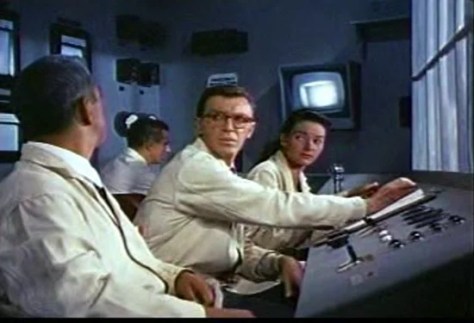What is it that separates schlock from the sublime in a science fiction movie? To the nondiscriminating, I suppose they all look the same. The same may go for the discriminating, but for opposite reasons. I know I have very high standards when it comes to my science fiction. This is the price I pay for having read so many excellent stories. Thus, for me the visual medium generally lacks, though there are exceptions.
So why do I keep going out to the drive-in? Well, occasionally there are good films, and if I know what I'm getting into, I can enjoy a bad film. Science fiction movies are generally dreadful, so I am well-prepared for the experience. My daughter, though only 10, is a discerning person, herself, so we always have good conversations about films afterward (and during!)

Last week, 4D Man was on the menu. It was made by the same crew that brought us The Blob. In brief, it involves a fellow who is convinced that, using the powers of his mind and some field-generating doohickey, he can force solid objects through other solid objects. He brings it to the attention of his sober, scientist brother, who eventually masters the art. In the process, the brother becomes a monster, for the application of said art causes rapid aging, and the only way to regain youth is to steal it from others. He becomes a sort of vampire, and his ability to become insubstantial renders him all but invulnerable.

The trick is to push really hard.
Quite an odd duck, this movie. For one thing, the sci-fi twist doesn't really get involved until halfway through. Instead, we are treated to a love triangle between the brothers and the elder brother's colleague/assistant. I say treated because I actually quite enjoyed this part. In particular, I was happy to see that the colleague, played by the talented Lee Merriwether, was intelligent and independent. When the younger brother, whose actor's name escapes me, attempts to nobly decline the lady's attentions in deference to his older sibling, she makes it perfectly clear that she is her own woman, and she chooses who she wants. She is also, ultimately, the hero of the movie, managing to vanquish the monster rather cleverly.

Scientists doing Science.

I think The World, The Flesh, and the Devil taught us how to resolve this situation.
There is a lot to enjoy about the movie. Robert Lansing plays the older brother in a competent, understated manner, and he is a pleasure to watch. As I mentioned upstream, Lee Merriwether's smart scientist character is a breath of fresh air. The younger brother's actor is eager, if nothing else. One might find the incessant jazz soundtrack somewhat off-putting, but I liked it. The special effects are inexpensive but convincing. It's in color, which is still uncommon for sci-fi films.

Big brother masters the art of pushing….

…and uses it predictably.

But is it worth the price?
But how was the science, you ask? Well, it's ludicrous, of course. The younger brother attempts to attribute the power of matter phase-through to a fourth-dimensional field that acts as an amplifier for the talented mind; hence, the movie's title.
I think it's hogwash. It's easier to believe that both brothers are mutants, and that the older brother, with his more-disciplined psyche, is able to master the ability. This hypothesis is strengthened by the fact that Lansing's character is able to phase even without the field generator.
From the reviews, it does not appear that 4D Man will beat out The Blob in popularity or box office. I attribute this, in part, to the lack of a catchy theme. It's still a fun 90 minutes if you look at it as a live-action comic book, however, and worth it for Merriwether and Lansing.
By the way, in case you've been under a rock the last few days, Senator Jack Kennedy has tossed his hat into the presidential race for this year. It is encouraging to think that my chronological peer could run for this nation's highest office. On the other hand, my political sympathies tend to be more in line with those of Hubert Humphrey and (the yet undeclared) Stuart Symington. Or Nelson Rockefeller, whose star rose and fell last year.

Just please please don't give us Tricky Dick in November!
Note: If you like this column, consider sharing it by whatever media you frequent most. I love the company, and I imagine your friends share your excellent taste!
P.S. Galactic Journey is now a proud member of a constellation of interesting columns. While you're waiting for me to publish my next article, why not give one of them a read!

(Confused? Click here for an explanation as to what's really going on)
This entry was originally posted at Dreamwidth, where it has  comments. Please comment here or there.
comments. Please comment here or there.

comments. Please comment here or there.
















